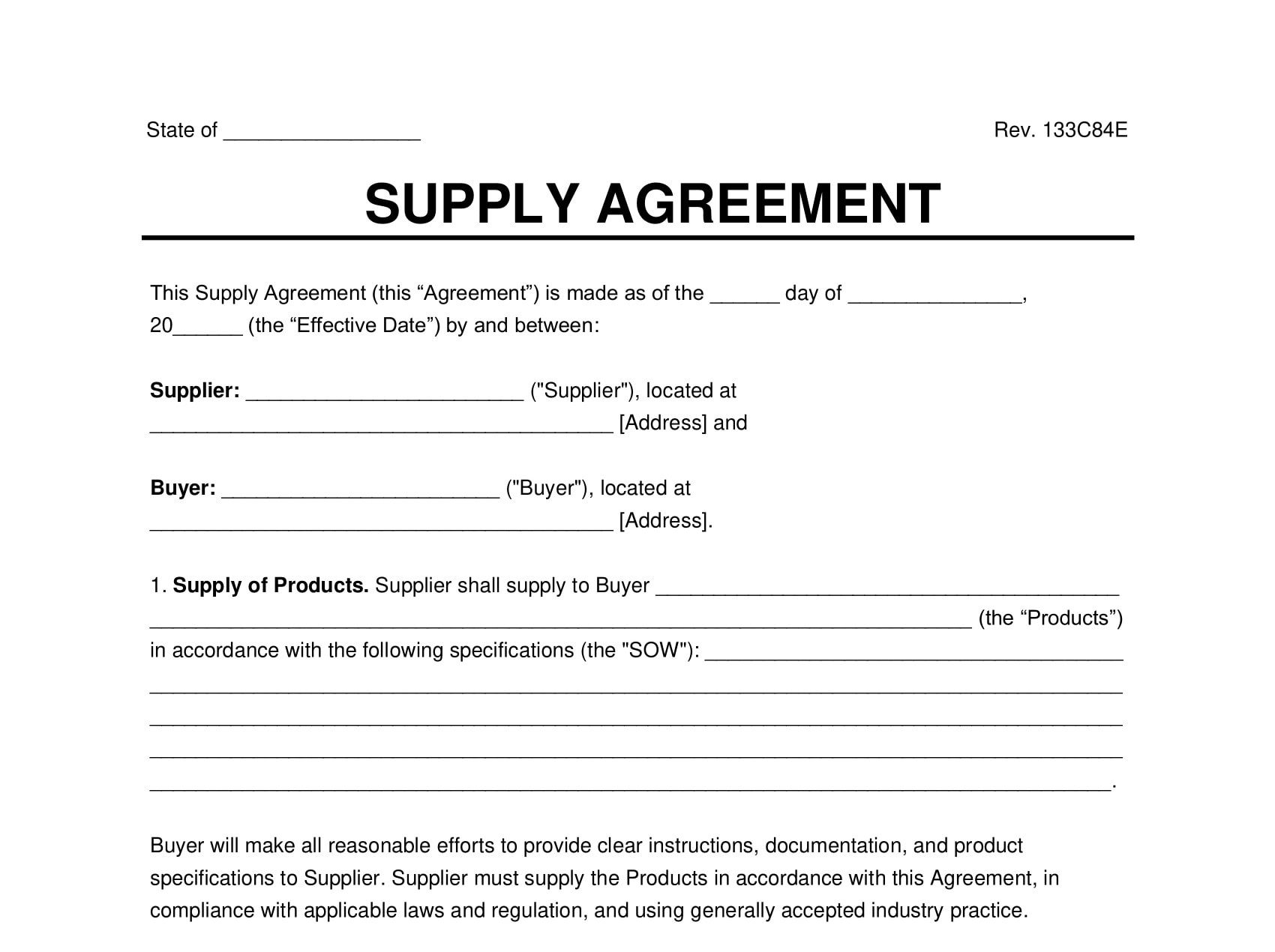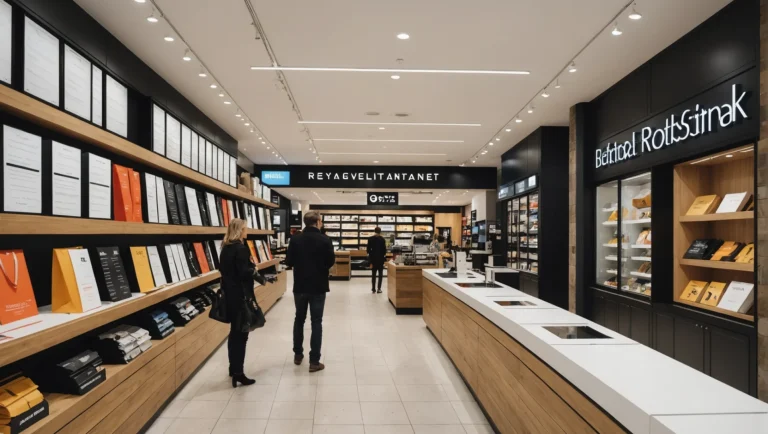In the retail business, various contracts play a critical role in defining the relationships between retailers, suppliers, employees, and other parties involved. Incorporate critical safety measures for retail environments to ensure a safe and secure atmosphere for all stakeholders involved.
From retail contracts outlining essential terms like product pricing and delivery schedules to franchise and lease agreements, these legal contracts help ensure that all parties agree on the rules governing their business relationship.
Whether it’s protecting intellectual property, establishing payment terms, or complying with applicable laws, understanding the types of retail agreements is crucial for operating a successful retail store.
In this guide, we’ll explore common retail contracts and when to use them to protect your business and ensure good faith in every transaction.
Save 80% of delivery management time
We handle everything:
- Dedicated operations manager
- Real-time tracking dashboard
- Automated customer notifications
- Urgent issue resolution
Why Put It in Writing? The Power of Documented Agreements
In the retail business, putting agreements in writing is essential to protect the interests of all parties involved. A written retail contract ensures that both parties agree on the essential elements, from payment terms to delivery schedules, and helps avoid misunderstandings.
Retail agreements, whether they involve suppliers, lease agreements, or intellectual property, serve as the foundation for a good faith business relationship. By documenting the contract terms, parties can outline their obligations, responsibilities, and provisions for prior written consent or material breach. A written agreement is also key to enforcing applicable laws and ensuring compliance with legal requirements.
Having a written notice clause, for example, can help manage potential disputes by providing clarity on the proper procedures for addressing disagreements. Ultimately, a documented retailer agreement protects both sides and provides the legal basis for resolving conflicts through civil litigation if needed.
7 Common Retail Contracts
1. Retail Contracts
Retail contracts are legal agreements between a retailer and a customer or between businesses, outlining the essential elements of a sale or service. These agreements govern how goods and services are exchanged in a retail business, detailing important provisions such as product pricing, delivery timelines, return policies, and payment terms. Retailer agreements often involve key issues like intellectual property usage, proprietary rights, and compliance with applicable laws. For example, intellectual property provisions may cover the use of trade names or brand logos when selling branded products. Additionally, such contracts often include clauses on dispute resolution, requiring written notice in the event of a disagreement, and specifying civil litigation as a final recourse. Ensuring compliance in retail is crucial for operational success, covering areas from legal contracts to everyday transactions. Discover the vital steps and practices to maintain compliance in your retail operations.

Retail contracts are essential for outlining each party’s obligations to ensure good faith in transactions, especially when the retailer sells goods on behalf of other companies or brands. The entire agreement between parties is typically consolidated in a formal written contract, detailing rights, responsibilities, and delivery schedules that have been mutually agreed upon. Discover key retail store policy examples to guide your operation and guarantee your team is well-informed about their duties and the standards.
This type of contract includes:
Payment terms and delivery schedules
Return policies and dispute resolution
Provisions for the use of intellectual property
Retail contract terms related to warranties and guarantees
Legal requirements such as applicable laws and written consent for specific actions
When to use it:
When selling goods or services in a retail store or online
To clarify payment, return, and intellectual property terms
To ensure both parties agree on all essential elements of the sale
When establishing rights and responsibilities between the retailer and other parties
2. Employment Contracts
Employment contracts within a retail business define the relationship between the employer and employees, ensuring that both parties involved understand their obligations. These contracts cover detailed descriptions of employee duties, working hours, compensation, and the terms of termination. In the retail industry, where high turnover rates are common, employment contracts are critical for maintaining stability and compliance with applicable labor laws.
A typical retail employment agreement may specify payment terms, including interest rates for any additional payment or overtime, and set expectations for job performance. It also establishes conditions for termination, such as providing prior written notice or outlining instances of material breach that would justify immediate dismissal. Employment contracts not only protect the retailer from civil litigation but also guarantee that employees are treated fairly under legal contract terms.
This type of contract includes:
Job responsibilities and duties
Payment terms, compensation structure, and any applicable bonuses
Termination clauses and notice requirements
Conditions for material breach or misconduct
When to use it:
When hiring new employees in a retail store or distribution center
To outline clear expectations for duties, performance, and compensation
To protect the retail business from potential legal disputes
To ensure good faith in the employment relationship between the retailer and staff
3. Supplier Contracts

Supplier contracts, also known as vendor agreements or distribution agreements, are crucial in a retail business for establishing the terms under which products are sourced and sold. These contracts detail product pricing, delivery schedules, and the allocation of responsibilities between the retailer and suppliers. Supplier agreements may also include intellectual property clauses, especially when the retailer is selling branded products from a manufacturer.
A retail contract with suppliers typically covers delivery timelines, specifying when and how goods should arrive at the retail store or distribution center. Payment terms, including any discounts or additional payments required for expedited deliveries, are also outlined. These contracts ensure that both the retailer and the supplier agree on key aspects of the relationship, including exclusivity rights in certain territories, as well as legal requirements for product quality and safety.
This type of contract includes:
Product pricing and discount structures
Delivery timelines and schedules
Intellectual property rights for branded products
Payment terms, including interest rates for late payments
Conditions for terminating the agreement due to breach or other failures
When to use it:
When establishing relationships with suppliers or manufacturers
To define delivery schedules and pricing terms for products sold in a retail store
To legally protect both the retailer and the supplier from material breaches
When negotiating exclusivity clauses or proprietary rights for certain goods
4. Franchise Agreements
Franchise agreements are legally binding contracts that allow a retailer to operate under an established brand name. In a franchise relationship, the franchisee pays the franchisor for the right to use intellectual property such as trade names, logos, and business models. This contract also sets out the terms under which the franchise will operate, including financial obligations like royalties, marketing fees, and product pricing.
A retail franchise agreement not only grants permission to use intellectual property but also details the support and training provided by the franchisor. Additionally, it defines the territorial rights of the franchisee and limits the franchisor’s ability to grant other agreements to competitors in the same region. This contract ensures that both parties involved have mutually agreed on the business relationship’s essential elements and protects the interests of the franchisee while maintaining the brand’s integrity.
This type of contract includes:
Intellectual property usage and proprietary rights
Payment terms, including franchise fees and royalties
Terms of support, training, and business operations
Territorial restrictions and non-compete clauses
When to use it:
When operating under a well-known brand as part of a retail franchise
To secure intellectual property rights and maintain brand consistency
To outline financial obligations and rights within the franchise
When establishing territory restrictions to avoid competition with other retailers
5. Lease Agreements

Lease agreements in the retail industry are contracts between a retailer and a property owner, defining the terms of renting retail space. These contracts cover important details like rent payments, duration, and any restrictions on how the retail space can be used. Lease agreements protect both parties by outlining each party’s rights and obligations, such as the retailer’s responsibility to maintain the property and the landlord’s obligation to make necessary repairs.
A retail lease agreement may include provisions for lease renewal, rent increases, and conditions for terminating the agreement. It is important for retailers to negotiate favorable terms to ensure the long-term success of their retail store. Provisions such as prior written consent for alterations or subleasing can also be included, ensuring that both parties agree on changes to the business arrangement.
This type of contract includes:
Rent payments and schedule of increases
Duration of the lease and conditions for renewal
Maintenance responsibilities and repair obligations
Conditions for terminating or modifying the lease
When to use it:
When renting retail space for a store or distribution center
To formalize the relationship between the retailer and the property owner
To ensure clarity regarding rent, maintenance, and lease renewal options
To protect both parties from legal disputes over property usage
6. Confidentiality Agreements
Confidentiality agreements, also known as non-disclosure agreements (NDAs), are essential in the retail industry for protecting sensitive business information from being disclosed to unauthorized parties. This could involve trade secrets, product pricing strategies, or intellectual property shared with suppliers, employees, or partners. The confidentiality agreement ensures that proprietary rights and intellectual property remain safeguarded, preventing the other party from using the information for personal gain or sharing it with competitors.
These agreements are particularly important in cases where a retailer is negotiating with other parties about new products or services, ensuring that all confidential information remains protected. The contract outlines what constitutes confidential information, the parties involved, and the duration of the confidentiality obligation.
This type of contract includes:
Definition of what constitutes confidential information
Responsibilities of parties to maintain confidentiality
Exceptions to the agreement and permitted disclosures
Legal consequences for breaches of confidentiality
When to use it:
When sharing sensitive business information with suppliers, manufacturers, or employees
To protect intellectual property, trade secrets, and other proprietary rights
When negotiating with other retailers or business partners
To ensure confidential information is not disclosed without prior written consent
7. Licensing Agreements
Licensing agreements grant a retailer permission to use intellectual property, such as a brand name, logo, or patented technology. These contracts are common in the retail industry, where retailers may license products to sell under a recognized brand. The licensing agreement outlines the terms of intellectual property use, including how the intellectual property may be displayed, sold, and marketed.
Retailers entering into licensing agreements must comply with the contract’s provisions, which often include royalty payments, sales targets, and restrictions on product modifications. The agreement may also stipulate that the licensee must meet certain quality standards and follow legal requirements related to the licensed property.
This type of contract includes:
Scope of the intellectual property being licensed
Payment terms, including royalties and sales targets
Duration of the agreement and renewal conditions
Restrictions on the use and modification of the intellectual property
When to use it:
When selling branded products or using a brand’s intellectual property
To ensure proper legal use of trademarks, patents, or trade names
To establish royalty payments and other financial obligations
When licensing a brand to gain market recognition in a retail store
Cornerstones of Retail Contracts: Essential Clauses Explained
Retail contracts contain several crucial clauses designed to formalize transactions, protect both parties, and minimize risks in the business relationship. By including specific provisions, a retail contract can safeguard the retailer’s interests while maintaining compliance with applicable laws. Key clauses such as payment terms, delivery schedules, and intellectual property usage ensure that both the retail store and other parties, like suppliers or employees, fully understand their rights and obligations. Understanding and adhering to retail compliance within contracts is fundamental for the smooth operation of your business. Discover effective methods and practices to maintain compliance in your retail contracts, thus securing your store’s success and stability.
Must-Know Clauses: A Quick Guide
Force Majeure Clause

In retail, unforeseen events such as natural disasters or global pandemics can disrupt the supply chain, causing delays or preventing the retailer from fulfilling their contract. The force majeure clause protects both parties in such cases, ensuring that neither the retailer nor the supplier is held responsible for delays or breaches caused by events beyond their control. For example, if a hurricane halts deliveries, the force majeure clause would ensure that neither party is liable for missing delivery schedules. Without this clause, they would have to rely on common law, which might not absolve them from liability.
Confidentiality Clause

Retailers often handle sensitive information, such as proprietary product designs, marketing strategies, or client data. A confidentiality clause, also known as a non-disclosure clause, ensures that both parties agree to keep this information private. For example, if a retailer enters into a contract with a manufacturer to produce goods with exclusive branding, this clause would prevent the manufacturer from sharing or using the retailer’s intellectual property without permission. By including this provision, retailers protect their trade names and proprietary rights from exposure or misuse.
Indemnification Clause

One of the most important aspects of a retail contract is protecting your financial interests. An indemnification clause allocates responsibility in the event of damages or losses. If a supplier provides defective goods that lead to customer complaints or legal action, the indemnification clause would require the supplier to compensate the retailer for any financial harm incurred. This clause is crucial for protecting a retail business from potential lawsuits or civil litigation while holding the responsible party accountable.
Termination Clause

Every contract must have clear guidelines on how and when it can be terminated. A termination clause outlines the conditions under which one party can end the agreement, whether due to material breach, failure to meet delivery timelines or mutual agreement. For example, if a supplier consistently misses delivery deadlines, the retailer may have grounds to terminate the contract and seek another provider. This clause also provides clarity on the consequences of termination, such as any outstanding payment terms or return of goods.
Pricing and Payment Terms Clause

One of the most fundamental clauses in a retailer agreement involves product pricing and payment terms. This clause specifies the cost of goods, any applicable discounts, and the terms for payment. It may also include details about interest rates on late payments or penalties for non-payment. For instance, if a retailer purchases goods from a supplier, the pricing clause will clearly define the cost, along with any additional payment conditions such as installment options or penalties for late payments. This clause ensures that both parties agree on the financial terms, preventing disputes over pricing or payments.
Intellectual Property Clause

For retailers who work with branded goods, protecting intellectual property is a critical concern. An intellectual property clause outlines the retailer’s rights to use trademarks, logos, or other proprietary materials. This is especially important when licensing or franchising products. For example, a retail store that sells goods under a licensed brand must adhere to strict guidelines regarding the use of trade names and logos, as defined in the contract. This clause helps prevent misuse of proprietary rights and ensures that both parties respect the agreed-upon intellectual property terms.
Why These Clauses Matter
Including these clauses in retail contracts allows retailers to build stronger, more secure business relationships with suppliers, employees, and other partners. From payment terms to confidentiality, each provision works to mitigate risks and clarify the responsibilities of all parties involved. By understanding and incorporating these clauses, retailers can maintain good faith relationships, ensure compliance with applicable laws, and protect their financial and intellectual assets.
Navigating the Negotiation Maze: Legal Insights for Retailers
Negotiating a retailer agreement can be a complex process, as it involves balancing both parties’ interests while ensuring that all contract terms comply with applicable laws. Retailers need to carefully evaluate each clause in the contract, from payment and delivery schedules to intellectual property and product pricing provisions. Negotiation requires clear communication about the expectations of the parties involved and may include discussions on prior written consent, termination clauses, and conditions for material breach.
Legal experts recommend having a detailed understanding of your business relationship before entering negotiations. Be prepared to discuss every aspect of the contract, including the detailed description of the services provided, pricing structures, and potential penalties for non-compliance.
The negotiation process should always aim for a mutually agreed outcome that satisfies both parties while protecting the retail business from future legal complications. Understanding the legal requirements and key provisions in the agreement will help you avoid costly disputes down the road. However, during negotiation processes, small claims cases can offer a practical alternative for resolving disputes involving smaller sums.
Mastering Contract Management: Strategies for Retail Success
Effective contract management is critical for maintaining long-term success in the retail industry. Managing retail contracts goes beyond simply signing an agreement—it requires ongoing monitoring to ensure that the parties involved are complying with the terms. Retailers must keep track of delivery schedules, payment terms, and any changes in product pricing. Establishing clear processes for handling written notice of modifications or disputes will also help avoid complications with other parties.
A strong contract management strategy involves reviewing your agreements regularly, updating terms to reflect new business relationships, and ensuring compliance with applicable laws. For example, a retail lease agreement may need to be revisited to address changes in rental rates or maintenance responsibilities. Likewise, a supplier agreement could require updates to delivery timelines or pricing structures based on new manufacturer conditions.
Retailers should also be mindful of the expiration dates of contracts, ensuring that renewal discussions happen in a timely manner to avoid interruptions in the supply chain or services. In summary, mastering contract management allows retailers to stay competitive, reduce risks, and foster strong, enduring partnerships with suppliers and other retailers.
Frequently Asked Questions
What are retail contracts, and why are they important?
Retail contracts are formal agreements between a retailer and another party, such as a supplier, customer, or employee. They outline the terms of sale, payment terms, delivery schedules, and other key provisions. These contracts are crucial for ensuring both parties understand their obligations and for protecting the retailer from legal disputes.
What key clauses should be included in a retail contract?
Essential clauses in a retail contract include payment terms, delivery timelines, product pricing, intellectual property rights, and termination provisions. Including these ensures clarity and helps protect the retailer in cases of non-compliance or unforeseen events.
Why is a force majeure clause important for retailers?
A force majeure clause protects retailers from being held liable if unexpected events, such as natural disasters, disrupt business operations. This clause ensures that both parties are not penalized for events beyond their control.
How do confidentiality clauses help retail businesses?
A confidentiality clause ensures that sensitive information, such as business strategies or intellectual property, is kept private. This prevents the unauthorized sharing of proprietary information with competitors or the public, safeguarding the retailer’s competitive edge.
What is the role of a termination clause in a retail agreement?
A termination clause outlines the conditions under which a contract can be ended by either party, such as due to a material breach or mutual agreement. This provides a clear exit strategy for businesses if the other party fails to meet contractual obligations.
How do retail contracts protect intellectual property?
Retail contracts often include intellectual property clauses to protect a retailer’s trade names, logos, and proprietary products. These clauses ensure that any use of the retailer’s branding or products by a supplier or partner follows the terms of the agreement.
What should I do if a contract dispute arises?
If a contract dispute occurs, first review the terms outlined in the agreement, particularly any provisions about dispute resolution. Many contracts will specify steps for resolving conflicts, such as mediation or arbitration, before escalating to civil litigation. Always seek legal advice if the situation cannot be resolved amicably.
Can retail contracts be amended?
Yes, retail contracts can be amended if both parties provide prior written consent. It’s important to document any changes in writing and ensure that both parties agree to the new terms to avoid future misunderstandings.
Navigating Retail Contracts with Confidence
Understanding various types of retail contracts is crucial for protecting your business and ensuring efficient operations. From retailer agreements that define payment terms and product pricing to lease agreements that outline the terms for renting a retail space, each contract plays a key role in managing business relationships. Having clear, well-defined contract terms not only protects you legally but also helps avoid disputes by ensuring all parties involved understand their obligations.
Being familiar with these retail contracts and the legal requirements surrounding them is essential for maintaining compliance with applicable laws and fostering strong partnerships with suppliers, employees, and other stakeholders. By carefully managing these agreements, you can safeguard your retail business, promote smoother operations, and reduce risks that could impact your long-term success.














